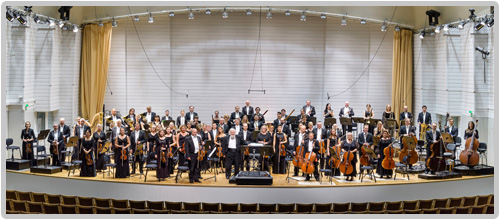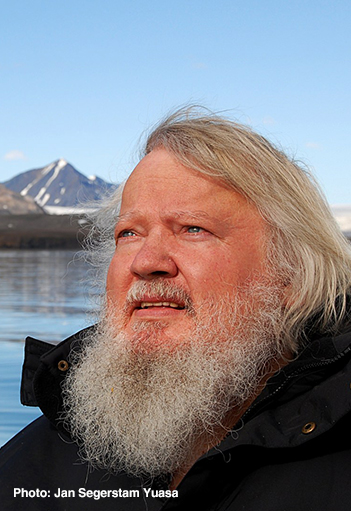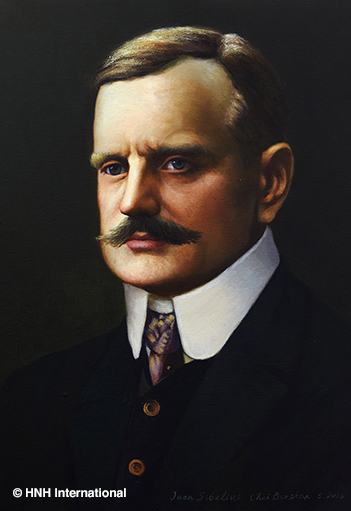- SIBELIUS, J.: Kuolema / King Kristian II / Overture in A Minor (Pajala, Torikka, Turku Philharmonic, Segerstam) 8.573299
- SIBELIUS, J.: Belshazzar's Feast / Overture in E Major / Scène de ballet / Cortège / Menuetto (Pajala, Turku Philharmonic, Segerstam) 8.573300
- SIBELIUS, J.: Pelleas and Melisande / Musik zu einer Szene / Autrefois / Valse Chevaleresque (Pajala, Nordqvist, Turku Philharmonic, Segerstam) 8.573301
- SIBELIUS, J.: Jokamies (Jedermann) / 2 Pieces, Op. 77 / In Memoriam (Pajala, Katajala, Söderlund, Palmu, Turku Philharmonic, Segerstam) 8.573340
- SIBELIUS, J.: Swanwhite / The Lizard / A Lonely Ski Trail / The Countess's Portrait (Eklundh, Turku Philharmonic, Segerstam) 8.573341
- SIBELIUS, J.: Scaramouche [Ballet] (Turku Philharmonic, Segerstam) 8.573511
The Turku Musical Society, which later formed the Turku Philharmonic Orchestra, was founded in 1790. As the oldest orchestra in Finland, the ensemble continues to develop and flourish under the baton of renowned conductors. From 2012 to 2019, the orchestra’s 74 musicians have been under the artistic leadership of Leif Segerstam. The orchestra’s resident composer is Mikko Heiniö.
Several of the Turku Philharmonic’s recordings have been awarded platinum discs and other prizes. In 2019 the orchestra won the International Classical Music Award for Best Collection with their recording of Jean Sibelius’s Incidental Music. In 2009 the orchestra was awarded the EMMA Classical Album of the Year for the recording Transient Moods.
The orchestra gives weekly concerts, often streamed live throughout the world, while its chamber music ensembles perform in the historical venues of Turku. The orchestra also organises family concerts and performs in opera productions. The Turku Philharmonic is a pioneer in audience accessibility, providing access to concerts online in hospitals, residential care homes and schools.
For more information, visit www.tfo.fi.
 Photo: Seilo Ristimäki
|

Born in 1944, Leif Segerstam was recognised internationally as a conductor, composer, violinist and pianist. He studied at the Sibelius Academy, Helsinki and The Juilliard School. He was chief conductor emeritus of the Helsinki Philharmonic Orchestra, and held honorary titles with the Malmö Opera, the Danish National Radio Symphony Orchestra, the Staatsphilharmonie Rheinland-Pfalz and the Turku Philharmonic Orchestra. He was also the chief conductor of the Austrian and Finnish Radio Symphony Orchestras plus the Royal Swedish Opera and director of the Finnish National Opera. He conducted most of the world’s most prestigious orchestras and was one of the most important ambassadors for Sibelius’s 2015 anniversary year. Segerstam began his conducting career in the opera houses of Helsinki, Stockholm and Berlin, and made guest appearances at international opera houses and festivals.
His many recordings have been critically acclaimed and feature works by contemporary composers as well as the complete symphonies of Mahler, Sibelius and Nielsen among many others. Segerstam was a voracious composer, notably developing a free-pulsative style in Rosenkranz form for his later symphonies which are performed without conductor. He was professor of conducting at the Sibelius Academy, Helsinki for many years. Segerstam was awarded the 1999 Nordic Council Music Prize and the Swedish Cultural Foundation’s Prize for Music in 2003. In 2004 he was given the annual Finnish State Prize for Music and in 2005 the Sibelius Medal.

Jean Sibelius grew to maturity at a time of fervent Finnish nationalism, as the country broke away from its earlier Swedish and later Russian overlords. Brought up in a Swedish-speaking family, Sibelius acquired a knowledge of Finnish language and traditional literature at school; early Finnish sagas proved a strong influence on his subsequent work as a composer. After early training in Helsinki and later in Berlin, he made his career in Finland, where he was awarded a state pension. Although he lived until 1957, he wrote little after 1926, feeling out of sympathy with current trends in music.
Stage Works
Sibelius wrote incidental music for Maeterlinck’s Pelléas et Mélisande, Procopé’s Belshazzar’s Feast and Shakespeare’s The Tempest. His well-known Karelia Suite was derived from incidental music for a pageant. His popular Valse triste was originally written for Järnefelt’s play Death to accompany a deathbed scene.
Orchestral Music
Symphonies
Sibelius wrote seven symphonies, an additional eighth apparently completed but destroyed. The first two of these enjoy particular popularity.
Symphonic Poems etc.
Symphonic poems by Sibelius, their inspiration usually from ancient Finnish legend, include En saga, the Lemminkäinen Suite, of which ‘The Swan of Tuonela’ and ‘Lemminkäinen’s Return’ form a part, Pohjola’s Daughter and Tapiola. Finlandia was adapted from music provided for Press Pension celebrations in 1899.
Concertos
Sibelius was trained as a violinist. His Concerto for the instrument was, however, a technically more demanding work than he could have tackled himself. Sibelius made a revised version, which now has a place in standard solo violin repertoire and still makes considerable demands on the performer.
Chamber Music
Chamber music by Sibelius includes the String Quartet ‘Voces intimae’, a Sonatina for violin, and a number of short pieces for violin and piano.
Piano Music
Although the musical achievement of Sibelius may be regarded as largely orchestral, he did also write a number of shorter piano pieces for which there was always a market.
Songs
Although he wrote some hundred songs over a period of more than 30 years, mainly settings of Swedish texts (eight in German and only a handful in Finnish), they have suffered comparative neglect by the side of his larger-scale orchestral and choral music. Sibelius regarded many of them as representative of his inner self.






























